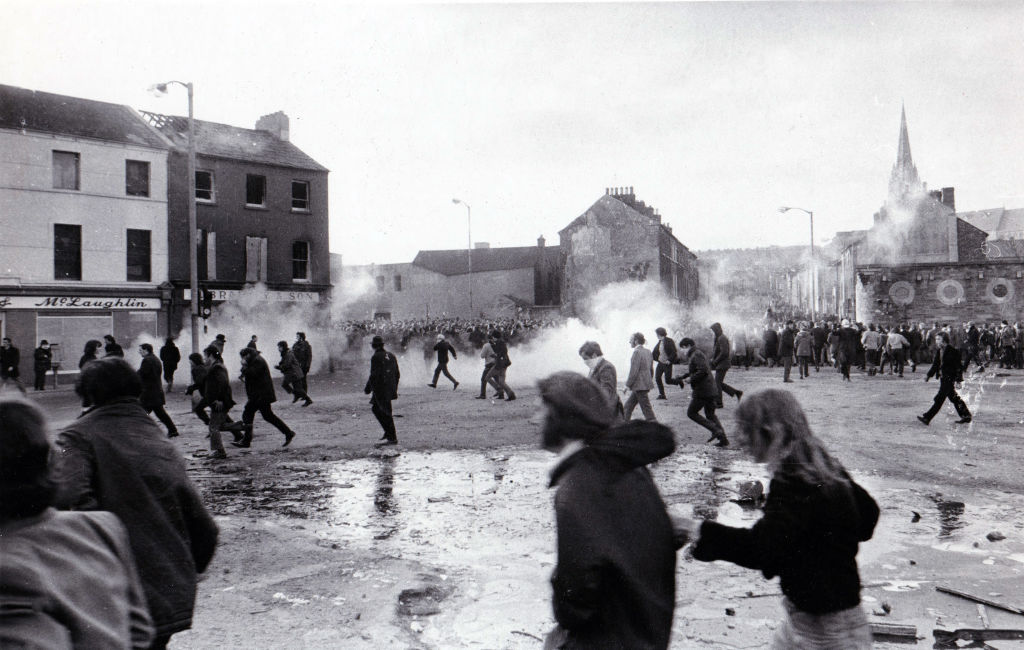Soldier F, a former paratrooper accused of shooting dead two unarmed protestors on Bloody Sunday in 1972, has been found not guilty of their murder and attempting to kill five others.
At court in Belfast, the Judge Patrick Lynch KC said the evidence before him ‘fails to reach the high standard of proof required in a criminal case’.
The Bloody Sunday case points to a broader trend in Northern Ireland, of how the courts are being used almost as a proxy to rehash the battles of the past
1972 was the most violent year of the so-called Troubles, with just under 500 killed. However, the events of that January day in Londonderry stood out and continue to do so in the public understanding of Northern Ireland’s past and the impact that past has on its present.
British soldiers shooting dead 13 British citizens on the streets of a city in the United Kingdom is an extraordinary proposition, regardless of which context or era it took place in. It is in some ways the perfect microcosm of the Northern Ireland issue at large; popular discontent rubbing up against state power which was ill-equipped to respond to it.
In 2025, at 53 years’ remove from Bloody Sunday, the trial has thrown into sharp focus the fundamentally vexed question of how to handle the challenge of dealing with Northern Ireland’s legacy in an even-handed way.
Solider F’s supporters, who gathered outside the court in Belfast each day throughout the trial, would point out what they see as a double standard.
In their view, this is part of a broader pattern. The hounding of British servicemen by the British crown through British courts having served their country is a grotesque spectacle when IRA terrorists who murdered British servicemen and civilians go about their lives under the protection of a de facto amnesty issued by the Blair government.
It has been pointed out that this verdict was delivered on the 32nd anniversary of the Shankill Road bombing, where eight Protestant civilians were killed by an IRA bomb which aimed – and failed – to assassinate the leadership of the UDA. Of the two IRA bombers, one was killed in the blast, but the survivor was released from prison under the terms of the Belfast Agreement.
Conversely, the relatives of those who died on Bloody Sunday – and indeed a great many others – would point out that British soldiers should be held to a higher standard of conduct than the shooting of unarmed civilians in the back.
Indeed, the Judge reiterated in his comments that the soldiers had ‘totally lost all sense of military discipline’ that day. This has been compounded by accusations that through the various inquiries into Bloody Sunday the soldiers in question have stuck to a recollection of events over 50 years which is at best economical with the truth.
The reaction will therefore be lit up in the primary colours of the divide. Unionist MPs have been taking to X to post the insignia of the Parachute Regiment, decrying the Public Prosecution Service for bringing forward a flimsy case and criticising nationalist politicians for their campaigning against Soldier F over the years, the most notable example being the former SDLP leader Colum Eastwood using parliamentary privilege to name the veteran.
The lawyers for the families of one of the dead men have also issued a statement stating, ‘Soldier F has been discharged from the defendant’s criminal dock, but it is one million miles away from being an honourable discharge.’
Both sides will therefore cling to their respective interpretation of events, as has always been the case in that particular part of the world. The notion of one single, universal version of the truth is unlikely to ever apply in Northern Ireland.
The Bloody Sunday case, however, points to a broader trend in Northern Ireland, of how the courts are being used almost as a proxy to rehash the battles of the past.
In February this year, the Northern Irish coroner Michael Humphreys ruled that the use of lethal force by the SAS to kill four IRA men – minutes after they had carried out an attack on an RUC station in 1992 – was not justified. The families subsequently said they would consider pursuing a criminal prosecution. The former veterans minister Johnny Mercer described it as a farce and was undoubtedly right to do so. This is but one example.
Instead of a proper legacy system – if such a thing exists – Northern Ireland seems doomed to whack-a-mole retrospective score setting. No grandiose bill presented at Westminster will ever solve that immutable tribal problem.







Comments